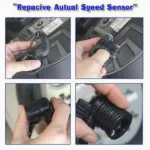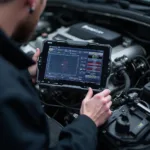Your OBD2 scanner isn’t connecting to your car’s ECU? This is a frustrating but common issue. This comprehensive guide will explore why your “obd2 wont read ecu” and provide solutions to get you back on track.
Understanding the OBD2-ECU Connection
The On-Board Diagnostics II (OBD2) system is your car’s communication hub, and the Engine Control Unit (ECU) is its brain. When the OBD2 scanner fails to communicate with the ECU, it’s like losing the ability to understand what’s happening under the hood. This prevents you from retrieving diagnostic trouble codes (DTCs), monitoring real-time data, and performing various tests.
Several factors can contribute to this communication breakdown. Understanding these potential causes is crucial for effective troubleshooting.
Common Causes of “OBD2 Won’t Read ECU”
- Blown Fuse: A blown fuse in the OBD2 circuit or the related ECU circuit can interrupt the power supply and prevent communication. Check your vehicle’s fuse box and replace any blown fuses.
- Faulty OBD2 Port or Connector: A damaged or corroded OBD2 port or a faulty connector on your obd2 computer cable can hinder the connection. Inspect the port for any visible damage or debris.
- Wiring Issues: Damaged or corroded wires in the OBD2 circuit can disrupt communication. This may require professional inspection and repair.
- Incompatible OBD2 Scanner: While most OBD2 scanners are designed to work with a wide range of vehicles, some scanners might be incompatible with specific car makes or models, especially older ones. Ensure your scanner is compatible with your vehicle’s year, make, and model.
- ECU Problems: A malfunctioning ECU can prevent it from communicating with the OBD2 scanner. This is often a more serious issue requiring professional diagnostics.
- Software Issues (with OBD2 software): Outdated or corrupted software on your scanning device or computer can also cause communication problems. Updating to the latest software version often resolves this.
Troubleshooting Steps for “OBD2 Won’t Read ECU”
Here are step-by-step instructions to troubleshoot your “obd2 wont read ecu” issue:
- Check the Basics: Ensure the ignition is turned to the “on” position (engine off for most scanners). Try a different OBD2 port if your vehicle has more than one.
- Inspect the Fuse: Locate the OBD2 fuse in your vehicle’s fuse box and check if it’s blown. Refer to your owner’s manual for the fuse location. Replace the fuse if necessary.
- Examine the OBD2 Port and Connector: Visually inspect the OBD2 port and the connector on your scanner for any damage, debris, or corrosion. Clean the port with compressed air or a contact cleaner if needed.
- Try a Different OBD2 Scanner: If possible, try connecting a different panlong obd2 not connecting scanner to your vehicle. This helps determine if the issue is with the scanner or the car.
- Check for Software Updates: Ensure your scanner’s software or the software on your connected device (e.g., laptop, smartphone) is up-to-date.
- Consult a Professional: If none of the above steps resolve the issue, it’s best to consult a qualified mechanic or auto electrician for further diagnosis. They have the specialized tools and expertise to diagnose and repair more complex problems like ECU malfunctions or wiring issues.
Why is my OBD2 scanner not communicating?
It could be a blown fuse, a bad connection at the OBD2 port, a faulty scanner, or even a problem with your car’s ECU.
What should I do if my OBD2 port is not working?
Check the fuse, inspect the port for damage, and try a different scanner. If the problem persists, consult a professional.
Can a bad ECU prevent OBD2 communication?
Yes, a faulty ECU can definitely interfere with OBD2 communication.
“A properly functioning OBD2 system is crucial for maintaining your vehicle’s health. Regular diagnostics can prevent minor issues from escalating into costly repairs,” says John Smith, a certified automotive technician with over 20 years of experience.
Conclusion
Troubleshooting an “obd2 wont read ecu” issue can often be done with some basic checks. However, more complex problems might require professional assistance. By following these steps, you can hopefully identify and resolve the problem, allowing you to access valuable diagnostic information and keep your car running smoothly. Remember, having a reliable OBD2 scanner is essential for any car owner. For persistent issues, consider checking resources like “craftsman obd2 won't read saab” or “obd2 usb cable driver windows 10” for specific solutions. If you need further assistance with your OBD2 scanner or vehicle diagnostics, don’t hesitate to reach out to our team.
FAQ
- Can I use any OBD2 scanner on my car? Most OBD2 scanners are compatible with a wide range of vehicles, but compatibility issues can arise with older models.
- What is an ECU? The Engine Control Unit (ECU) is the brain of your car’s engine management system, controlling various functions.
- How much does an OBD2 scanner cost? Prices range from affordable basic models to more expensive professional-grade scanners.
- Where is the OBD2 port located? The OBD2 port is typically located under the dashboard on the driver’s side.
- What should I do if my OBD2 scanner shows no codes? This could indicate a communication problem, a faulty scanner, or simply no stored codes.
- Can obd2 immobilizer bypass affect the ECU reading? It depends on the specific bypass method and vehicle, but it’s possible for it to interfere.
- How do I check for a blown OBD2 fuse? Consult your owner’s manual for the fuse box location and the specific OBD2 fuse.
For further assistance, contact us via WhatsApp: +1(641)206-8880, Email: [email protected] or visit us at 789 Elm Street, San Francisco, CA 94102, USA. We offer 24/7 customer support.

